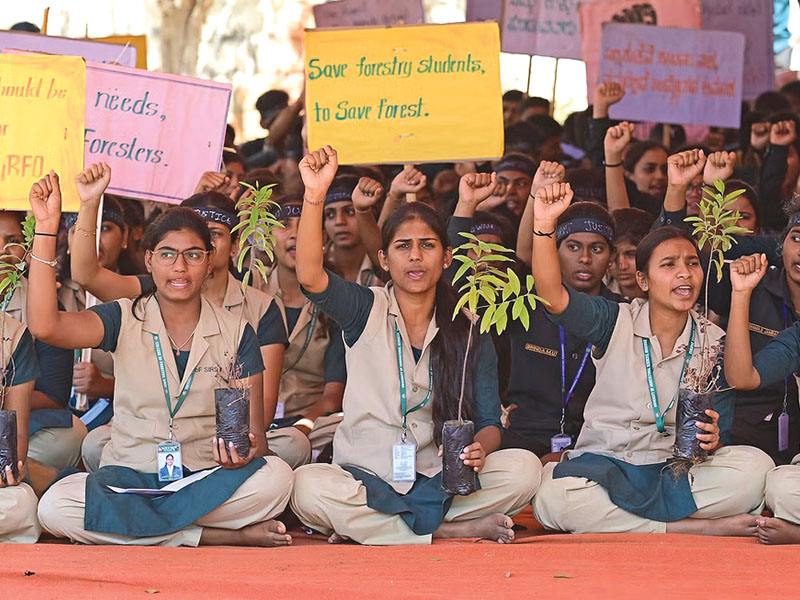Reshma Ravishanker (Bengaluru)

Protesting forestry students: “right to feel wronged”
Over 700 students from three state government-run forestry colleges in Karnataka who — were on a month-long protest in their college campuses, congregated in Bengaluru to stage a protest between February 26-29. Their demand is the state government stipulates that only forestry sciences graduates will be inducted into the positions of Assistant Conservator of Forests (ACF), Range Forest Officer (RFO), and Assistant Range Forest Officer (ARFO) — the entry level forests conservation and management cadre at the state level. Top level positions such as District/Divisional/Forest Officers, Conservator of Forests, Chief Conservators and Principal Chief Conservator of Forests are held by members of the Indian Forest Service (IFoS) — one of three All India Services including Indian Administrative Service and Indian Police Service.
Although resentment has been brewing for a while since the state government slashed the quota for forestry graduates for the post of RFOs from 75 percent to 50 percent in 2018, the trigger for the current protest is a report submitted in January by T.M. Vijay Bhaskar, Karnataka’s former chief secretary. The Bhaskar Report recommends filling all vacant RFO positions through promotions which could result in non-forestry graduates constituting a majority within the forests management service.
Karnataka — one of India’s green states with forest cover of 38,284 sq. km, the fourth highest countrywide — hosts three Colleges of Forestry — in Sirsi (Uttara Kannada district), Ponnampet (Kodagu district) and Iruvakki (Shivamogga district). According to the protesters, 450 students who graduate annually after a four-year Bachelor of Forestry degree programme, are confronted with the rising spectre of unemployment because generalists who clear the Karnataka Public Services Commission (KPSC) exam are being inducted into the forestry service.
Two decades ago in 2003, the state government decreed that 50 percent of ACF, RFO and Deputy RFO positions should be reserved for graduates with specialised forestry qualifications. Subsequently in 2012, this reservation was hiked to 75 percent for RFO positions. However in 2018, it was reduced again to 50 percent. Now with the Bhaskar Report recommending filling of all vacant RFO positions through promotions, students of the state’s three forestry colleges are up in arms against the government for reducing reserved quotas for forestry graduates and freezing all new direct recruitment.
“The government reducing the quota from 75 percent to 50 percent five years ago had already shrunk the number of jobs in forestry service for specialist graduates. Now the Bhaskar Report has opened up promotions to RFO to all KPSC graduates. This is unfair, unjust and illogical. The posts of ACF, RFO and Deputy RFO require specialised knowledge which only forestry graduates possess. In a country where the forest area is rapidly decreasing, we need experts not generalists, in decision making positions. Moreover, forestry is not privatised in India. Therefore, employment into the government’s forestry service is our only employment option,” says Manoj C, a student of College of Forestry, Ponnampet.
This contention that specialised forestry graduates should constitute a majority within the forestry service is seconded by Dr. Vasudeva, Dean, College of Forestry, Sirsi. “Currently, a mere 16 percent of staff in ACF and RFO posts are forestry graduates. This is wrong. The bachelor’s degree in forestry is a four-year programme in which government invests Rs.12-14 lakh per student to ensure graduating students are thorough in forests science and management. It’s ironical that after investing so much in them, the government doesn’t want to recruit them. In the case of agriculture and horticulture departments, there is a clear mandate that for certain posts, a degree in these fields is mandatory. That is not the case for forestry jobs. Therefore, forestry graduates are right to feel they are wronged,” says Vasudeva.
According to a 2023 report of the Indian Institute of Science, Bengaluru, Karnataka’s forest cover reduced by 2 percent between 2016-2023. Another report titled ‘Cauvery River: Land Use Dynamics Biodiversity and Hydrological Status’ reveals that the state has lost 57 percent of its natural cover over the past five decades. Contrary to popular belief, there’s more to forestry than planting trees. Forest managers need to be well-versed in forest floor flora and fauna and ecology diversity. Pity the state government isn’t aware about the critical importance of inducting specialists rather than generalists into this increasingly important service.
Also read: Why is Brazil’s Amazon rainforest on fire